| Srl | Item |
| 1 |
ID:
144180
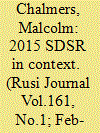

|
|
|
|
|
| Summary/Abstract |
Significant new investment in defence and security announced in the 2015 National Security Strategy and Strategic Defence and Security Review has sent positive signals about the future of the UK’s role in the world. However, argues Malcolm Chalmers, further reform and flexibility will be needed if the UK is to remain an important security player in the international arena.
|
|
|
|
|
|
|
|
|
|
|
|
|
|
|
|
| 2 |
ID:
100370
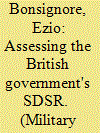

|
|
|
| 3 |
ID:
138351
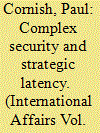

|
|
|
|
|
| Summary/Abstract |
Whichever party or parties form the next UK government, a Strategic Defence and Security Review (SDSR) is expected to begin soon after the general election in May. The review might be a ‘light touch’ exercise—little more than a reaffirmation of the SDSR produced by the coalition government in 2010. It seems more likely, however, that the review will be a lengthier, more deliberate exercise and one which might even last into 2016. For those most closely engaged in the process the challenge is more complex than that confronted by their predecessors in 2010. The international security context is more confused and contradictory; the UK's financial predicament is still grave; security threats and challenges will emerge that cannot be ignored; the population's appetite for foreign military engagement appears nevertheless to be restricted; and prevailing conditions suggest that the risk-based approach to national strategy might be proving difficult to sustain. Two key questions should be asked of the review. First, in the light of recent military experiences, what is the purpose of the United Kingdom's armed forces? Second, will SDSR 2015–16 sustain the risk-based approach to national strategy set out in 2010, and if so how convincingly? Beginning with a review of the background against which SDSR 2015–16 will be prepared, this article examines both enduring and immediate challenges to the national strategic process in the United Kingdom and concludes by arguing for strategic latency as a conceptual device which can complement, if not reinvigorate, the risk-based approach to national strategy and defence.
|
|
|
|
|
|
|
|
|
|
|
|
|
|
|
|
| 4 |
ID:
104739


|
|
|
|
|
| Publication |
2011.
|
| Summary/Abstract |
The SDSR has been praised and derided in almost equal measure. In some cases, the government grasped the nettle, making difficult choices about current and future procurement and acquisition; in others, it appeared to fumble, hamstrung by constrained political will and inter-service competition. As the dust settles, RUSI asks three former defence representatives from each of the main political parties for an evaluation of the review's process and conclusions.
|
|
|
|
|
|
|
|
|
|
|
|
|
|
|
|
| 5 |
ID:
137998
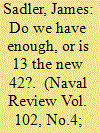

|
|
|
|
|
| Summary/Abstract |
The author discusses the reason why we currently have 13 frigates and six destroyers, and asks whether this is enough to meet our current and future commitments.
|
|
|
|
|
|
|
|
|
|
|
|
|
|
|
|
| 6 |
ID:
104741


|
|
|
|
|
| Publication |
2011.
|
| Summary/Abstract |
The strain of the past decade's military operations - both in terms of financial overextension and the toll on the armed forces - has called into question the age of liberal intervention begun in Kosovo in the 1990s. As the full impact of the SDSR's costcutting measures are felt in the UK, a mixed approach may be emerging that would balance Alliance commitments, bilateral co-operation and small-scale international missions whilst at the same time managing expectations about the UK's reach and capability.
|
|
|
|
|
|
|
|
|
|
|
|
|
|
|
|
| 7 |
ID:
104152
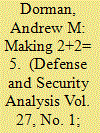

|
|
|
| 8 |
ID:
111667
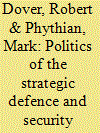

|
|
|
|
|
| Publication |
2012.
|
| Summary/Abstract |
This article examines the politics of the October 2010 Strategic Defence and Security Review (SDSR), focussing on the points of difference between the main political parties (and within the Cameron coalition government) and the political dynamics of the review process. In examining how the government's core mission to reduce the country's 'historic deficit' impacted on the review process and outcomes, we are also able to highlight the practical results of a political philosophy that is currently being implemented across Whitehall. We argue that defence is a path-finding policy area for a new kind of post-industrial bureaucratic environment typified by a 'thin-client' and 'smart customer' function that interacts with industry.
|
|
|
|
|
|
|
|
|
|
|
|
|
|
|
|
| 9 |
ID:
100535
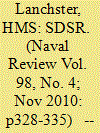

|
|
|
| 10 |
ID:
127251
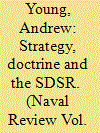

|
|
|
| 11 |
ID:
139746
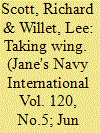

|
|
|
| 12 |
ID:
139205
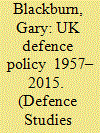

|
|
|
|
|
| Summary/Abstract |
This paper uses the strategic dimensions concept and content analysis of nine key defence white papers published between 1957 and 2010 to assess which factors most influence declaratory policy. The paper also notes that the development of defence policy has been accompanied by the “muddling through” vs. decisive choice debate which reflects the tensions within policy between the thesis of strategy and the antithesis of fiscal parsimony. The paper maintains that defence policy is ultimately contingent upon external threats and it is these, rather than the desire to economise, which are the key policy drivers. It concludes that this extrinsic factor will determine the outcome of the next SDSR and though this is not necessarily incongruent with the desire to economise, events may prove otherwise.
|
|
|
|
|
|
|
|
|
|
|
|
|
|
|
|
| 13 |
ID:
100629
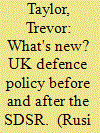

|
|
|
|
|
| Publication |
2010.
|
| Summary/Abstract |
Much attention on the Strategic Defence and Security Review focused on the issues of deterrence and inter-service rivalry. But a number of other important choices, not obviously apparent in the document, might instead suggest the direction in which British defence policy has evolved. The outcome may be affordable, but is it at the cost of shortterm coherence?
|
|
|
|
|
|
|
|
|
|
|
|
|
|
|
|